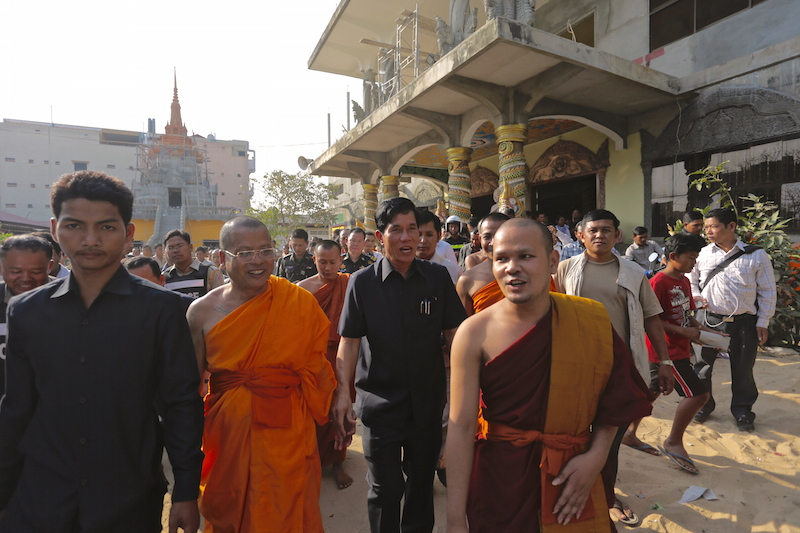Wat Samakki Raingsey used to be one of the few pagodas in Phnom Penh where out-of-town protesters hit by forced evictions could be sure to find a free and safe place to spend their nights while lobbying the government for help.
No more. The pagoda turned away its first group of protesters on Tuesday night.

Though the group from Koh Kong province was let in on Wednesday morning, the pagoda’s chief monk, Thack Ha Sam Ang, said municipal authorities had warned him not to allow protesters to stay the night, or even enter the pagoda’s gates, without the government’s consent.
“It was more than telling me; it was a threat,” he said, declining to elaborate on the nature of the threats, exactly who made them, or when they were issued.
“The monks’ hearts are open. We have never banned them from staying,” he added. “But if authorities do not come to ask [to let them in], we do not dare to let them stay because we get pressure from authorities.”
Wat Samakki Raingsey, in addition to hosting protesters from out of town, has been one of the few pagodas in the country to regularly defy the country’s Buddhist hierarchy by speaking out on politically sensitive issues.
Early last year, City Hall launched an investigation into Samakki Raingsey over the fatal stabbing of a senior monk at the pagoda and other unspecified “anti-government acts.” A city spokesman at the time said the pagoda’s lack of cooperation with authorities was “like a secession.”
On Wednesday, deputy Phnom Penh governor Khuong Sreng denied that the city had warned the pagoda not to let protesters stay without government consent. But he said the monks did have to tell authorities who they let in.
“This is our administrative procedure. If the people who stay at the pagoda cause any problems, who will be responsible for them? It is the monk chief,” he said. “If the monks don’t report to police, how can we solve the problem?”
Chak Sopheap, director of the Cambodian Center for Human Rights, said she was unaware of any laws giving the government control over a pagoda’s guest list, “nor should any such invasive restriction on freedom of association and assembly of this kind be imposed.”
Taken together with the city’s recent decision to move Freedom Park—the government’s designated site for public protest—from central Phnom Penh to the city’s outskirts, she said, “this appears to be a further blatant attempt by the government to restrict the ability of people to gather together and engage in peaceful protest.”
The protesters from Koh Kong were eventually let into the pagoda at the request of district authorities, after spending the night outside the gates on the street.
Sing Ket, one of the protesters, said her 2-year-old son had caught a fever from spending the night outdoors.
“We understand the situation,” she said. “If we insist on staying, the monk chief would get in trouble. [Government officials] treat us like garbage.”
(Additional reporting by Zsombor Peter)